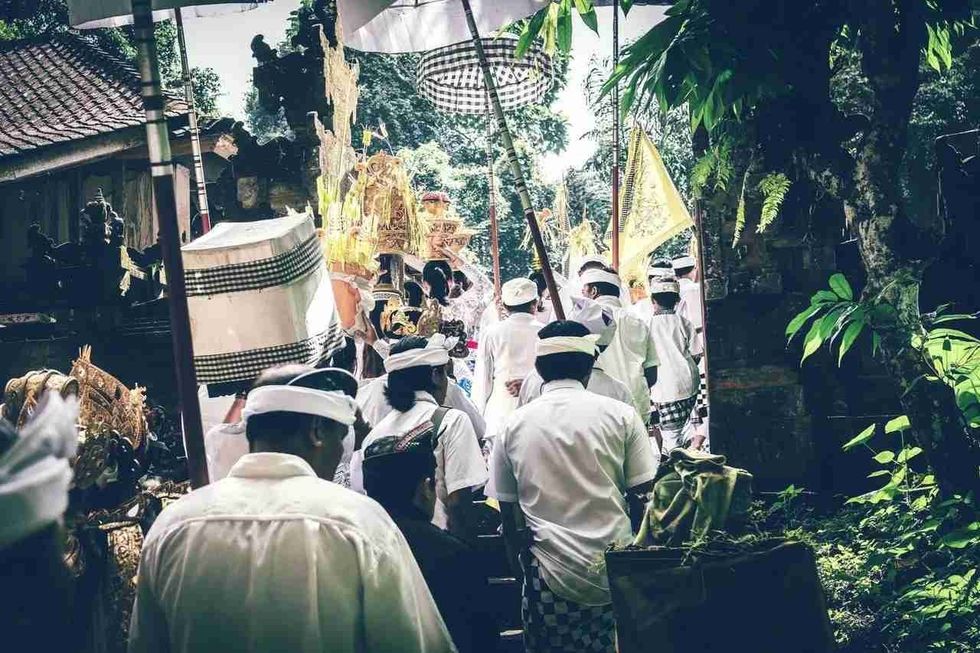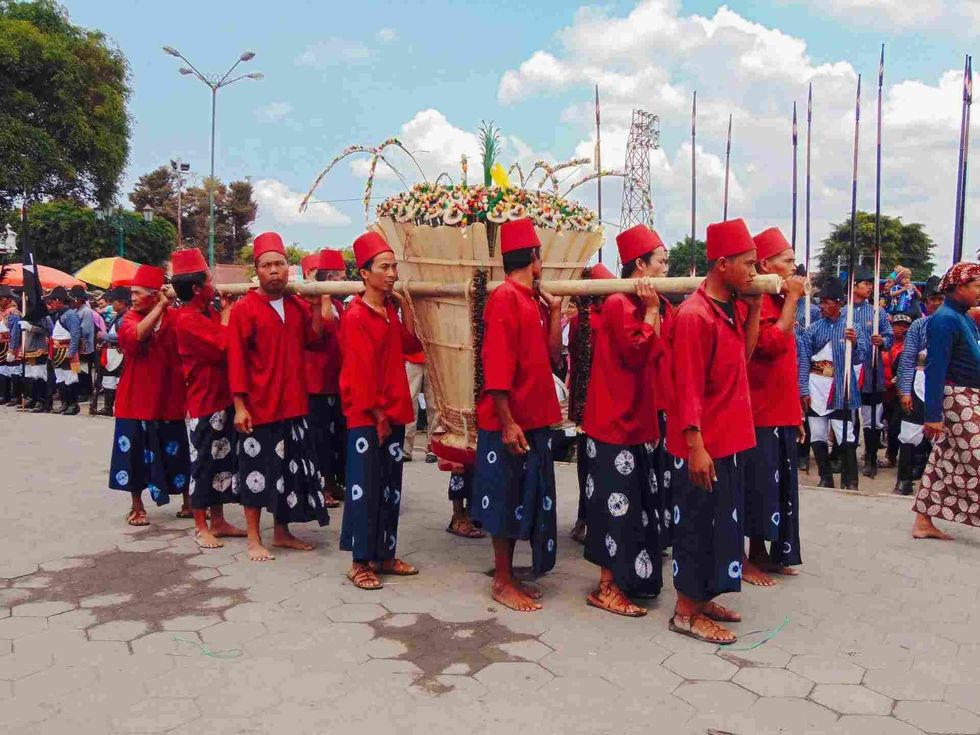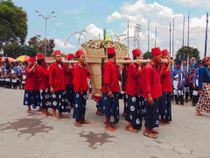73 Indonesian Culture Facts To Prove How Vibrant The Country Is

Indonesia is a hulking tropical archipelago brimming with volcanoes, rainforests, and marvelous creatures.
A land of typhoons, monsoons, and over 17,000 islands and islets, the most populated being Java. Indonesia shares Borneo, New Guinea, and Timor with other states.
Now, this gargantuan assortment of equatorial isles was never unified into a single sovereign state until fairly recently. There isn't a particular Indonesian language.
Indonesia's pre-history is a fossilized conundrum, but things get more discernible with the arrival many millennia ago of Melanesians who hunted and hand-printed their ways through the jungle. Their descendants today dwell in the east part of the nation.
Still, ethnic majorities in the country spring from the Austronesians who set sail from Taiwan and arrived first in Sulawesi and then around the time Egyptians were assembling the pyramid, disembarked on Java, Sumatra, Borneo, and Timor bringing rice, pigs, and pottery.
Though originally animists who worshipped their ancestors, islands of Indonesia eagerly absorbed the culture and spirituality of India including Hinduism and Buddhism. One of the earliest Indonesian kingdoms was a Hindu one.
The 7th century saw the rise of the Srivijaya kingdom on Sumatra which gained considerable wealth and power from trade via its grip on the naval routes linking India to China.
The Srivijaya artists were highly skilled. But the presence of plenty always lures predators and the state was handicapped by the invasion of Rajindra Chola and slowly declined thereafter.
Meanwhile, on Java, the ascent of Mangand Kingdom was spotted whose mysterious Seylendra Dynasty constructed the extraordinary Borobudur, Central Java which is the biggest Buddhist Temple in the world, in the early 9th century. The Hindu Sanjaya Dynasty followed and built Indonesia's biggest Hindu Temple known as the Prambanan.
The Javanese were apparently so pleased with these architectural wonders that they built some more.
The power was subsequently concentrated in Eastern Java. In the late 1200s, the Mongol Emperor of China sent emissaries to the island to demand tribute, but the Javanese disfigured the envoys and sent them packing.
Naturally, the emperor was outraged and ordered a huge invasion.
Enter Raden Vijaya; who cleverly allied with the invading Mongols to defeat a rival for the throne after which he turned against Mongols who while almost invincible on open plains were more than a little inconvenienced in the thick hot dripping climate of Java.
After two months of Guerilla warfare, the weary Mongols retreated and Vijaya went on to establish the mighty Majapahit Empire.
Introduction To Indonesian Culture
Indonesia is a culturally rich land where people have cherished those enchanted islands for thousands of years. Inspiring histories of the land below the wind, astounding relics from pre-historic times, or a testament to the wondrous age-old cultural practices, here fascinating indigenous folkways live through the test of time emphasizing the resilience of local creativity and vigor.
- Magnificent divine temples adorn the landscape as if forming an exhibition of pervasive spirituality. Religion has always been the cornerstone of life since ancient times.
- Indigenous wisdom is traditionally practiced in pursuance of living in harmony with nature.
- Filling the heart of both hosts and visitors' funeral rites is a festivity as much as it is a celebration of life, an occasion to gather family members from all over the world.
- Rich architectural heritage shaped by diverse cultural, historical, and geographical influences, recognized is one of Indonesia's true national treasures.
- Today's legacy of art and craft continues to enrich the culture playing a significant role in those traditional ceremonies and daily life of the people, adapting wonderful traditional art forms to modern times resulting in popular tourist attractions that kept remarkable folk artistic expression alive as they are an embodiment of the way of life of locals.
- Astounding cultural and historical diversity, where various cultures have crossed paths for many centuries, an impressive variety of numerous ethnic groups, this is an interwoven history of Indonesia's beautiful cultural diversity that unfolds in the landscape.
- The island nation has an eclectic mix of indigenous and foreign communities, which gave rise to a diverse culture.
- The country is strategically placed between South Asia, the Middle East, and the Far East, making it a cultural hotspot. As a result, numerous religions and cultures have coexisted in Indonesia. This includes Hinduism, Islamism, Christianity, Buddhism, and even Confucianism.
- The result is a complex artistic admixture veritably different from the original indigenous societies.
- Exemplifications of the emulsion of Islam with Hinduism include Javanese Abangan belief.
- Balinese balls have stories about ancient Buddhist and Hindu fiefdoms. Meanwhile, in Sumatra, you will find Islamic art forms and armature, especially in the Minangkabau and Aceh regions.
- Music, traditional art, and sport are combined in a martial art form named Pencak Silat.
- In the West, Indonesia has been depicted as a land of wisdom, technology, and ultramodern entertainment where films, music, and TV shows play a role, yet the country has political issues.
- India has specially told Indonesian songs and pictures. A popular song is Indian-metrical dangdut, which has Malay folk music and Arab music influences.
- However, there are some pockets in the country where Indonesia has preserved its rich and unique indigenous culture.
- Indigenous ethnical groups Mentawai, Asmat, Dani, Dayak, Toraja, and numerous others are still exercising their ethnic customs, rituals and wearing traditional clothes.
- Palm oil, sisal, and rubber are some plantation-grown products that are prominent in Sumatra, whereas tea, sugar, and coffee are prominent in Java.
Indonesian Traditions And Values.
Indonesia is a vast archipelago that comprises 17,000 islands spanning 3,200 mi (5,150 km) from east to west, between the Pacific and Indian Oceans in Southeast Asia.
- What traditions are in Indonesia? Spices such as nutmeg, cloves, and pepper are cultivated mainly in the outer islands, especially in East Java.
- Pluralism and Inclusiveness: Indonesia consists of different persuasions, societies, and races from all kinds of regions.
- Pluralism is the generality of accepting this diversity. People understand that diversity lives, and so they try to maintain equality with one another.
- Indonesia largely upholds the public maxim Bhinneka Tunggal Ika. It means orchestration in diversity.
- Freedom of Beliefs: There is six designated religion in Indonesia comprising Islam, Protestantism, Catholicism, Hinduism, Buddhism, and Confucianism.
- People are allowed to express their views and beliefs in a way that they do not harm any other people.
- Persuasions are important in the working of societies in Indonesia. The impact of values, traditions, and societies.
- Being Regardful to Live in Harmony: Indonesians largely believe that respect is an important value to maintain harmony and peace.
- Due to the different lines and beliefs that live in Indonesia, people may have different opinions on certain goods.
- Still, these differences do not tear them incremental because Indonesians understand that being dutiful to one another is necessary.
- Cooperative means gotong royong in Bahasa Indonesia. Throughout generations, this generality is proudly carried out on certain events.
- It's one value that Indonesian believe. It is important to always remain within society.
- It works when a group of people is working together to reach a certain thing. Furthermore, it also serves the purpose of helping one another.
- In Indonesia, discussion and agreement are called musyawarah and mufakat.
- This is a value that people still uphold in different social surroundings analogous to academe or family.
- The purpose is to come up with a result for a specific problem by agitating. Initially, the people speak out their minds, and then they can reach a conclusion.
- Family is an important aspect in Indonesia. The people truly and immensely believe that one should understand how to respect parents from an early age.
- A reason for this is because parents give everything that a child needs indeed when they are not yet born.
- Indonesians believe in the generality of esteeming the elders. The elders are seen as wiser and endured.
- Thus, the immature bones must not display arrogance. Youthful people are encouraged to show their respect for their elders in an open manner.
- This can be in the form of using polite language when directly conversing with them.
- Cultivated Humanity: In Indonesia, people believe that nothing should be physically or spiritually restrained against their will.
- In addition, Indonesia also upholds the value whereby the people earn the right to be defended from unjust treatments.
- Nothing is allowed to be the subject of oppression. The people are obliged to be treated fairly and accordingly.
- Social Justice for Everyone: While living within their communities, people are given equal chances to pursue their dreams and happiness.
- Likewise, the people can also use the natural resources of the nation to meliorate their livelihoods.
- Every work and every trouble has the purpose of perfecting the quality of the citizens. As a result, people can attain substance.
- This belief is called Sumarah in Javanese societies. Sumarah's station implies a total amenable station to God.
- The inner station will only manifest in people who have faith in the actuality of the almighty God who gives us life.
- As well as truly believe, that God is the one who created the world in its own way.

Unique Features Of Indonesian Culture.
Even though there are over 583 proven ethnic languages and dialects used daily by the people of this country, the official language of Indonesia is the 'Bahasa language'.
- What is unique about Indonesian culture? English, Dutch, Bahasa, and Javanese are some of the local dialects found in Indonesia.
- More than half of the population speaks either Indonesian or Malay language.
- Until 1942, Dutch was the official language, and some adults still converse in this language.
- The Javanese language is one of the most common languages in Indonesia, with an estimated number of 70 million speakers.
- The largest Muslim population is found in Indonesia. In comparison to some Muslim countries in the Middle East, most are identified as Sunni Muslims are only moderately religious.
- Indonesia is termed as a land full of contrasts with fiery volcanoes and peaceful seas, crumbling temples and modern high-rises, countless tropical birds and Komodo dragons, and young people on scooters wearing brightly-colored batik shirts and sarongs.
- The tradition of Indonesia is veritably different, the Indonesian people conforming to hundreds of ethnic groups, each with their own myths and legends.
- Stories within this system of lore frequently incorporate supernatural realities and magical brutes, which form a corridor of Indonesian tradition. Some stories speak about creation myths and place naming legends that are frequently intertwined with literal numbers and events.
- Ancient rituals for mending and traditional drugs as well as complex doctrines regarding health and complaint can also be planted.
- These native myths are fairly free from foreign influences, similar to Torajans, Nias, Bataks, Dayaks, and Papuans. Javanese, Balinese, and to some degree Sundanese were told by Hindu-Buddhist Indian tradition as early as the first century CE.
- Hindu gods, legends, and epics similar to Ramayana and Mahabharata were espoused and acclimated into a uniquely original form.
- Hindu-Buddhist fabulous beings have a part in Javanese and Balinese tradition, including Hindu gods and icons, devatas, asuras, apsaras (known as hapsari or bidadari), kinnaras, while native gods of nature similar as Semar, Dewi Sri, and Nyai Loro Kidul are moreover given linked as their Hindu counterpart or incorporated into a Java-Bali Hindu pantheon unknown in India.
- For illustration, native rice goddess Dewi Sri is linked with Lakshmi the shakti of Vishnu, and Semar and his sons, the Punakawans, are incorporated into the epic of Mahabharata in Javanese wayang kulit, as the zany retainers of the Pandavas.
- Several names relate to gods, similar as Dewa (devas), Dewi (Devi), dewata (devatas), and in native traditions generally appertained to as Batara ( manly God) and Batari ( womanish goddess).
- After the coming of Islam to the Indonesian archipelago, Islamic tradition especially those dealing with spiritual beings, similar as devils, demons, jinns, and angels, entered the Indonesian tradition.
- In Sumatra, Malay, Aceh, and Minangkabau, traditions were nearly entirely superseded by Islamic tradition.
- Still, belief in original spirits similar to the timber guardian, the ghost of water or haunted places still exists, frequently associated with a jinn or the tortured soul of a departed human.
Examples Of Indonesian Culture.
Listed below are some examples of vibrant Indonesian culture.
- What is the main culture in Indonesia, and what is it known for? In East Java, the Tenggerese celebrate the Kesodo Festival each year by performing a pilgrimage to the Bromo Volcano.
- To ensure that the volcano shouldn't erupt, Indonesian culture sacrifices goats and chickens by throwing them into the volcano at midnight, . The Krakatoa volcano is a part of the Indonesian archipelago.
- The Indonesian cuisine comprises indigenous techniques and ingredients influenced from India (curries), China (stir-frying), the Middle East (Kebabs), and Europe, including products that were imported by Spanish and Portuguese traders before the Dutch colonized the islands.
- Sports like soccer, badminton, and Pencak silat (which is a traditional form of martial arts) are popular in Indonesia.
- Indonesian culture also promotes building and flying colorful kites.
- Indonesian people are extremely family-oriented. They believe that family is the most important aspect of Indonesian culture.
- It doesn't matter whether they wear western styles or traditional clothing. Indonesian culture promotes modest dressing styles.
- Among an estimated number of three hundred officially recognized Indonesian cultures, there are many types of traditional games, namely cockfighting in Bali, stone jumping in Nias, and annual bull races in Madura.
We Want Your Photos!
More for You
Bachelor of Arts specializing in Multimedia and Mass Communication

Ada ShaikhnagBachelor of Arts specializing in Multimedia and Mass Communication
As a skilled communicator with exceptional interpersonal abilities, Ada holds a Bachelor's degree in Multimedia and Mass Communication from SIES (Nerul) College of Arts, Science & Commerce. Fluent in English and proficient in German, Ada enjoys engaging in meaningful conversations with people while striving to achieve her goals.
Bachelor of Science specializing in Microbiology, Masters of Science specializing in Biotechnology

Pratiti NathBachelor of Science specializing in Microbiology, Masters of Science specializing in Biotechnology
A Master's in Biotechnology from Presidency University and a Bachelor's in Microbiology from Calcutta University. Pratiti holds expertise in writing science and healthcare articles, and their inputs and feedback help writers create insightful content. They have interests in heritage, history, and climate change issues and have written articles for various websites across multiple subjects. Their experience also includes working with eco-friendly startups and climate-related NGOs.
Disclaimer
1) Kidadl is independent and to make our service free to you the reader we are supported by advertising. We hope you love our recommendations for products and services! What we suggest is selected independently by the Kidadl team. If you purchase using the Buy Now button we may earn a small commission. This does not influence our choices. Prices are correct and items are available at the time the article was published but we cannot guarantee that on the time of reading. Please note that Kidadl is a participant in the Amazon Services LLC Associates Program, an affiliate advertising program designed to provide a means for sites to earn advertising fees by advertising and linking to Amazon. We also link to other websites, but are not responsible for their content.
2) At Kidadl, we strive to recommend the very best activities and events. We will always aim to give you accurate information at the date of publication - however, information does change, so it’s important you do your own research, double-check and make the decision that is right for your family. We recognise that not all activities and ideas are appropriate for all children and families or in all circumstances. Our recommended activities are based on age but these are a guide. We recommend that these ideas are used as inspiration, that ideas are undertaken with appropriate adult supervision, and that each adult uses their own discretion and knowledge of their children to consider the safety and suitability. Kidadl cannot accept liability for the execution of these ideas, and parental supervision is advised at all times, as safety is paramount. Anyone using the information provided by Kidadl does so at their own risk and we can not accept liability if things go wrong.
3) Because we are an educational resource, we have quotes and facts about a range of historical and modern figures. We do not endorse the actions of or rhetoric of all the people included in these collections, but we think they are important for growing minds to learn about under the guidance of parents or guardians.







